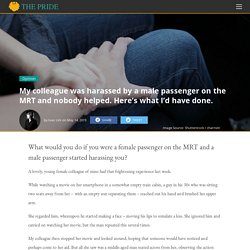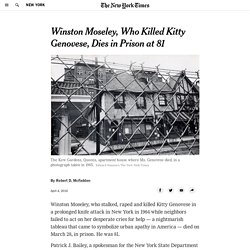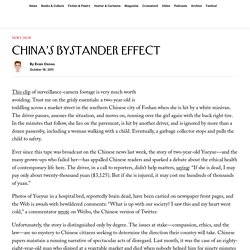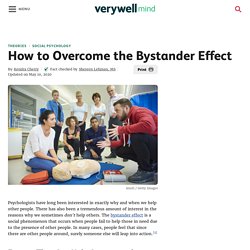

Being part of a large crowd makes it so no single person has to take responsibility for an action.
The bystander effect shows that an individual will not feel compelled to help as the responsibility for helping is being shared among the group of observers, hence the odds of someone offering help to the distressed person drop significantly. However, if there is only one person, he/she will feel the full weight of responsibility.
On the other hand, during an emergency situation, an individual has the natural tendency to conform to the situational responses by the surrounding observers. When other observers fail to react, individuals often take this as a signal that a response is not needed or not appropriate.
The Science of Empathy. THE BYSTANDER EFFECT. My colleague was harassed by a male passenger on the MRT and nobody helped. Here's what I'd have done. - The Pride.
What would you do if you were a female passenger on the MRT and a male passenger started harassing you?

A lovely, young female colleague of mine had that frightening experience last week. While watching a movie on her smartphone in a somewhat empty train cabin, a guy in his 30s who was sitting two seats away from her – with an empty seat separating them – reached out his hand and brushed her upper arm. She regarded him, whereupon he started making a face – moving his lips to simulate a kiss. She ignored him and carried on watching her movie, but the man repeated this several times. My colleague then stopped her movie and looked around, hoping that someone would have noticed and perhaps come to her aid.
Winston Moseley, Who Killed Kitty Genovese, Dies in Prison at 81. While there was no question that the attack occurred, and that some neighbors ignored cries for help, the portrayal of 38 witnesses as fully aware and unresponsive was erroneous.

The article grossly exaggerated the number of witnesses and what they had perceived. None saw the attack in its entirety. Only a few had glimpsed parts of it, or recognized the cries for help. Many thought they had heard lovers or drunks quarreling. There were two attacks, not three. Kitty Genovese case - Intro to Psychology. Breaking Stories and Opinion Articles. Showing of 1 - 20 from 5 results.

China’s Bystander Effect. This clip of surveillance-camera footage is very much worth avoiding.

Trust me on the grisly essentials: a two-year-old is toddling across a market street in the southern Chinese city of Foshan when she is hit by a white minivan. The driver pauses, assesses the situation, and moves on, running over the girl again with the back right tire. In the minutes that follow, she lies on the pavement, is hit by another driver, and is ignored by more than a dozen passersby, including a woman walking with a child. Eventually, a garbage collector stops and pulls the child to safety.
Ever since this tape was broadcast on the Chinese news last week, the story of two-year-old Yueyue—and the many grown-ups who failed her—has appalled Chinese readers and sparked a debate about the ethical health of contemporary life here. Photos of Yueyue in a hospital bed, reportedly brain dead, have been carried on newspaper front pages, and the Web is awash with bewildered comments: “What is up with our society? BYSTANDER INTERVENTION. How to Overcome the Bystander Effect. Psychologists have long been interested in exactly why and when we help other people.

There has also been a tremendous amount of interest in the reasons why we sometimes don't help others. The bystander effect is a social phenomenon that occurs when people fail to help those in need due to the presence of other people. In many cases, people feel that since there are other people around, surely someone else will leap into action.1 While the bystander effect can have a negative impact on prosocial behavior, altruism and heroism, researchers have identified a number of different factors that can help people overcome this tendency and increase the likelihood that they will engage in helping behaviors.2 Some of these include: Witnessing Helping Behavior Sometimes just seeing other people doing something kind or helpful makes us more willing to help others. Imagine that you are walking into a large department store. Being Observant. The Bystander Effect - You Can Break the Cycle. Active bystander.
Quiz & Worksheet - The Bystander Effect. Free MCAT Social and Behavioral Sciences Flashcards - Bystander Effect. Want to review MCAT Social and Behavioral Sciences but don’t feel like sitting for a whole test at the moment?

Varsity Tutors has you covered with thousands of different MCAT Social and Behavioral Sciences flashcards! Our MCAT Social and Behavioral Sciences flashcards allow you to practice with as few or as many questions as you like. Get some studying in now with our numerous MCAT Social and Behavioral Sciences flashcards. New to the 2015 MCAT is the Psychological, Social, and Biological Foundations of Behavior section that tests students’ understanding of how psychosocial factors impact biology, behavior and behavioral differences, and how people consider their relationships to themselves and to their larger surroundings. In addition, this section requires students to understand how socioeconomic status, access to healthcare and health insurance, and level of health literacy can affect a person’s overall physical and psychological well-being.